人教版(2019)必修第一册Unit 5 Languages around the world Discovering Useful Structures课件(共33张PPT)
文档属性
| 名称 | 人教版(2019)必修第一册Unit 5 Languages around the world Discovering Useful Structures课件(共33张PPT) |
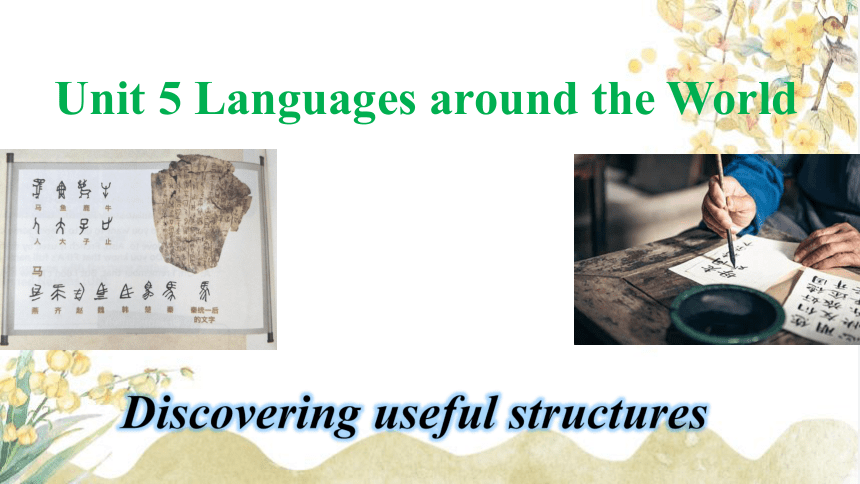
|
|
| 格式 | pptx | ||
| 文件大小 | 4.1MB | ||
| 资源类型 | 教案 | ||
| 版本资源 | 人教版(2019) | ||
| 科目 | 英语 | ||
| 更新时间 | 2024-11-13 00:00:00 | ||
图片预览

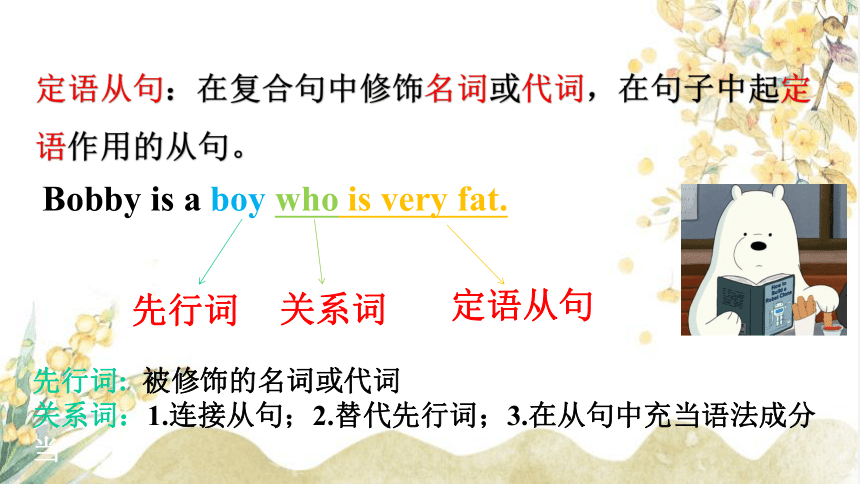
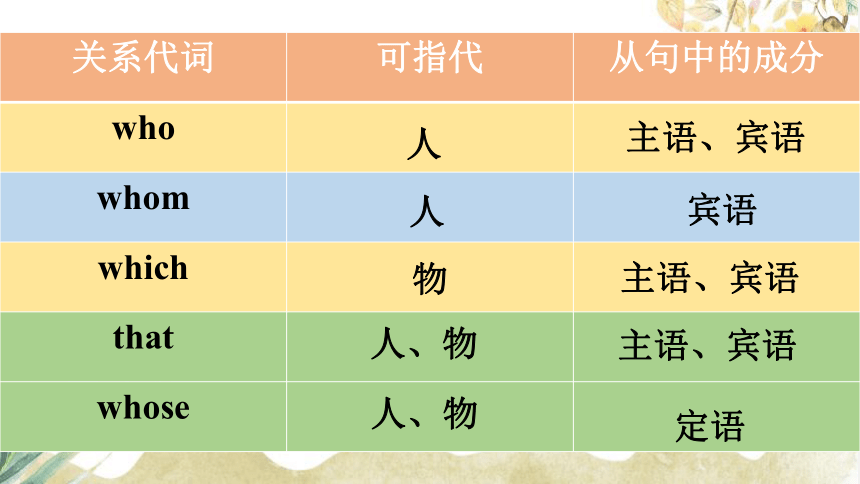
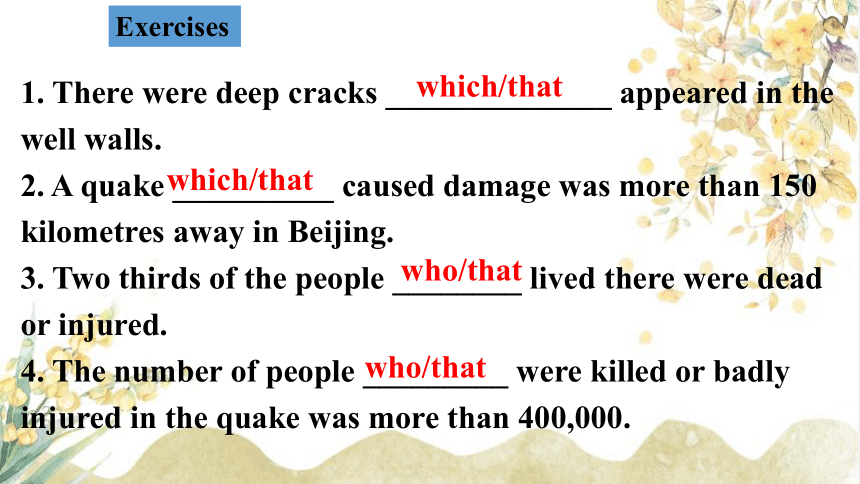
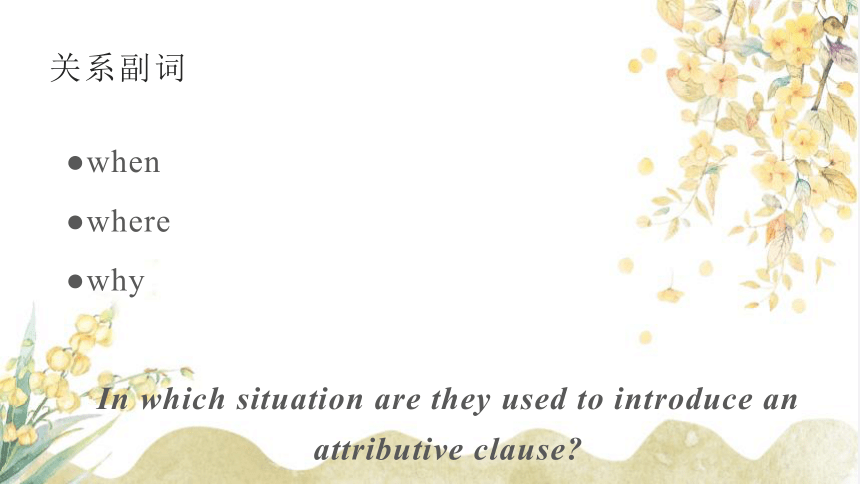
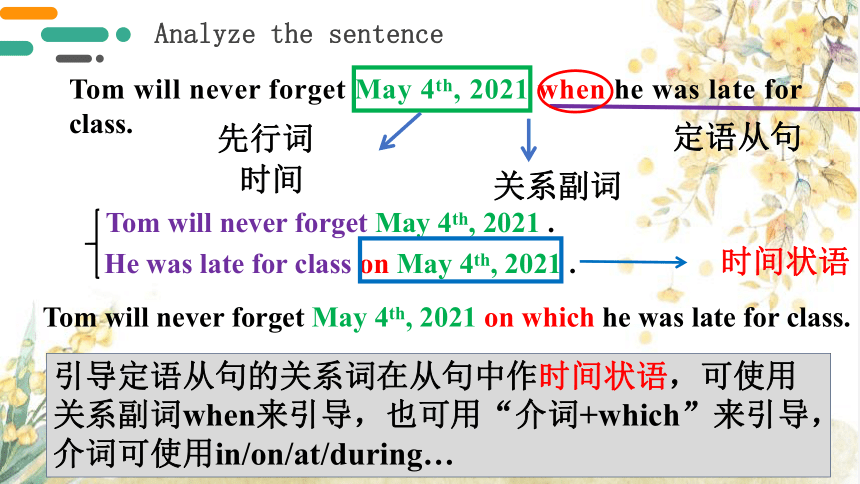
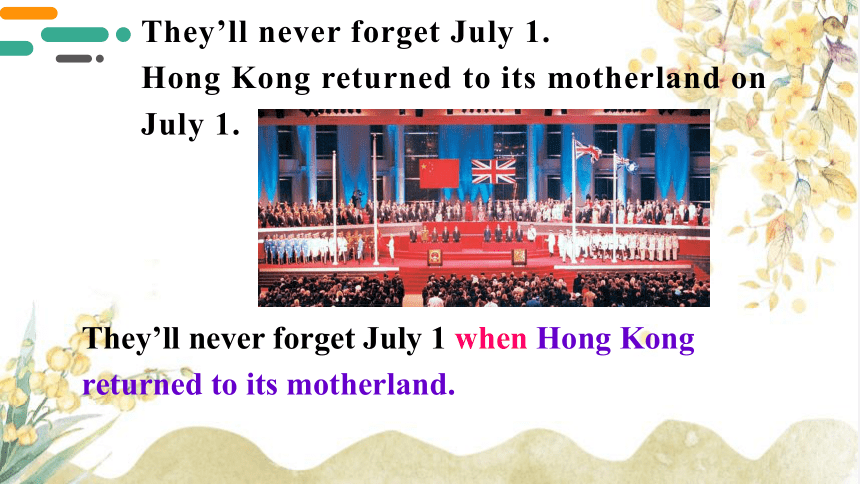
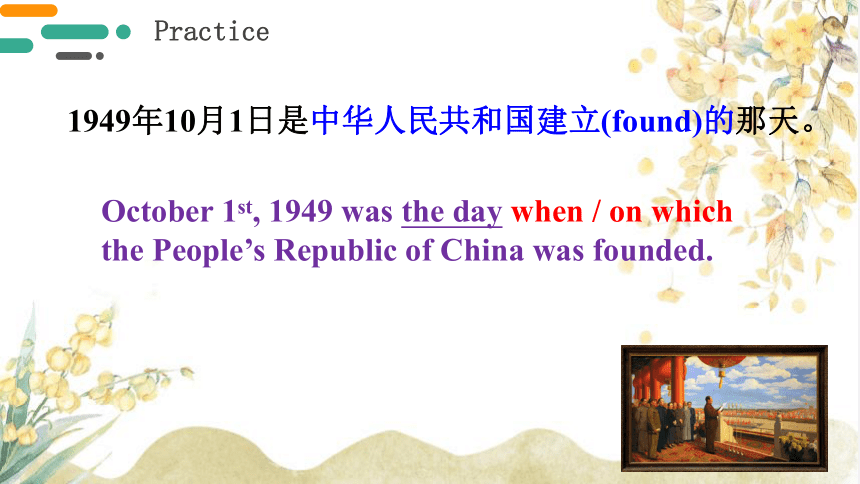
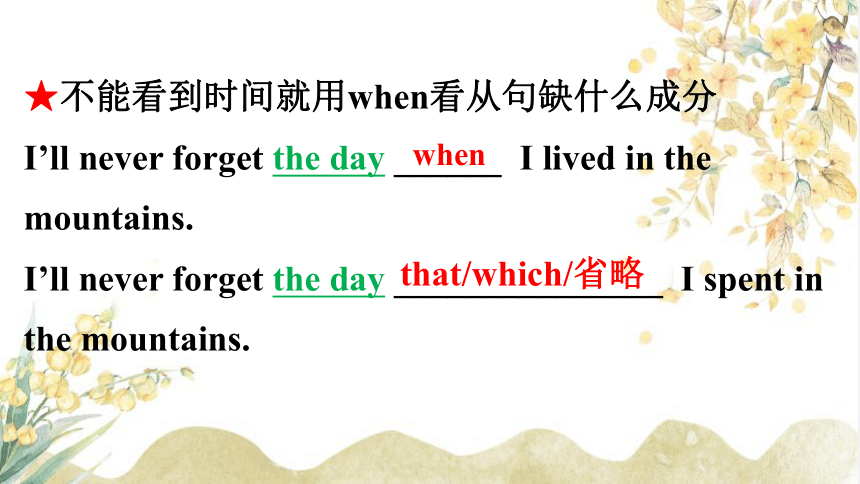
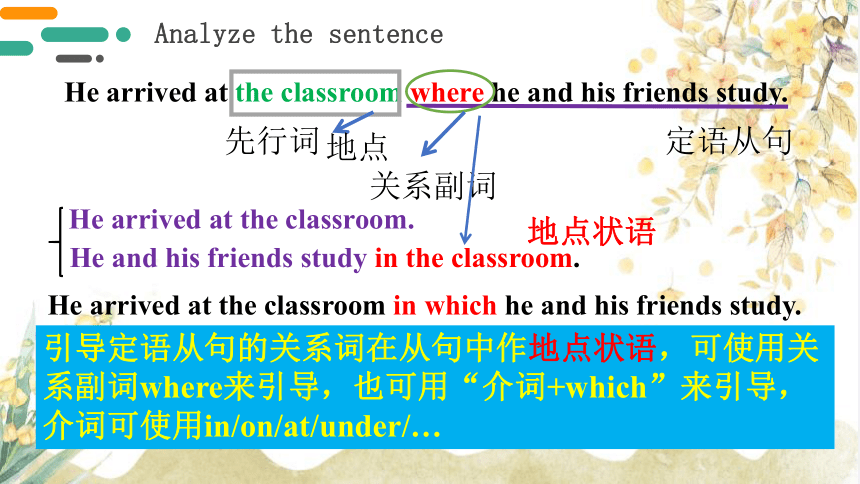
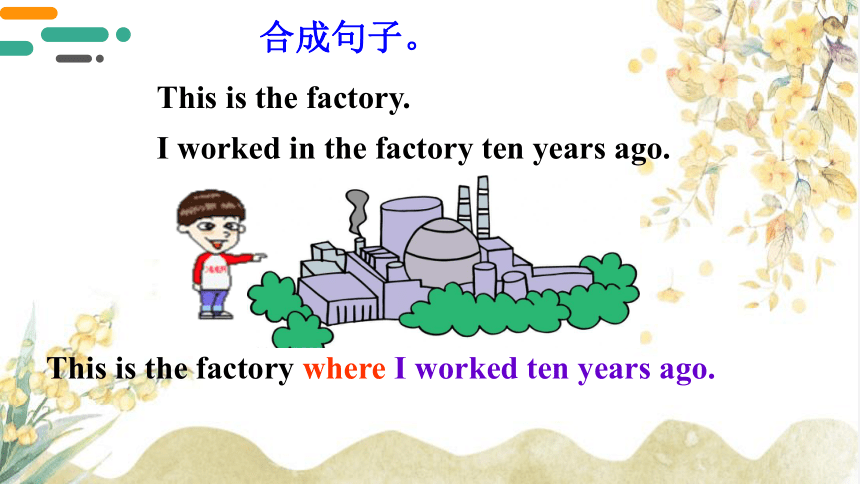
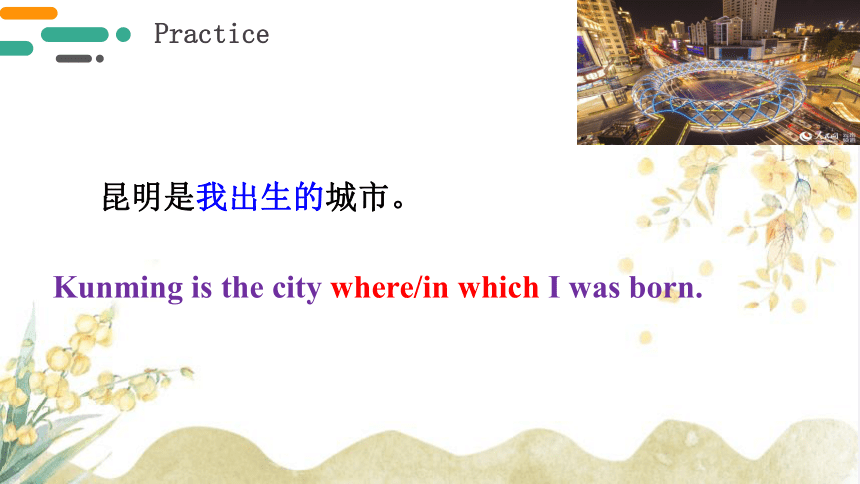
文档简介
(共33张PPT)
Unit 5 Languages around the World
Discovering useful structures
定语从句:在复合句中修饰名词或代词,在句子中起定语作用的从句。
Bobby is a boy who is very fat..
先行词
关系词
定语从句
先行词: 被修饰的名词或代词
关系词:1.连接从句;2.替代先行词;3.在从句中充当语法成分 当
关系代词 可指代 从句中的成分
who
whom
which
that
whose
人
主语、宾语
人
宾语
物
主语、宾语
人、物
主语、宾语
人、物
定语
Exercises
1. There were deep cracks ______________ appeared in the well walls.
2. A quake __________ caused damage was more than 150 kilometres away in Beijing.
3. Two thirds of the people ________ lived there were dead or injured.
4. The number of people _________ were killed or badly injured in the quake was more than 400,000.
which/that
which/that
who/that
who/that
关系副词
when
where
why
In which situation are they used to introduce an attributive clause
Tom will never forget May 4th, 2021 when he was late for class.
Analyze the sentence
先行词
关系副词
定语从句
Tom will never forget May 4th, 2021 .
He was late for class on May 4th, 2021 .
Tom will never forget May 4th, 2021 on which he was late for class.
引导定语从句的关系词在从句中作时间状语,可使用关系副词when来引导,也可用“介词+which”来引导,介词可使用in/on/at/during…
时间
时间状语
They’ll never forget July 1.
Hong Kong returned to its motherland on July 1.
They’ll never forget July 1 when Hong Kong returned to its motherland.
October 1st, 1949 was the day when / on which the People’s Republic of China was founded.
1949年10月1日是中华人民共和国建立(found)的那天。
Practice
★不能看到时间就用when看从句缺什么成分
I’ll never forget the day ______ I lived in the mountains.
I’ll never forget the day _______________ I spent in the mountains.
when
that/which/省略
He arrived at the classroom where he and his friends study.
Analyze the sentence
先行词
关系副词
定语从句
He arrived at the classroom.
He and his friends study in the classroom.
He arrived at the classroom in which he and his friends study.
引导定语从句的关系词在从句中作地点状语,可使用关系副词where来引导,也可用“介词+which”来引导,介词可使用in/on/at/under/…
地点
地点状语
This is the factory.
I worked in the factory ten years ago.
合成句子。
This is the factory where I worked ten years ago.
Kunming is the city where/in which I was born.
昆明是我出生的城市。
Practice
★不能看到地点就用where,看从句缺什么成分
This is the house _______ he was born.
This is the house _____________ was set up by his parents.
where
that/which
先行词是situation, case, point, condition, stage 等抽象地点的名词,且关系词在定语从句中作状语时,也应用where引导。
He gets into a situation where it is hard to decide what is right or wrong.
The reason why I was late was that I didn't catch the bus!
Analyze the sentence
先行词
关系副词
定语从句
原因
The reason was that I didn't catch the bus!
I was late for the reason.
The reason for which I was late was that I didn't catch the bus!
引导定语从句的关系词在从句中作原因状语,可使用关系副词why来引导,why可换成“for + which”
原因状语
There are many reasons.
People like traveling for many reasons.
There are many reasons why people like traveling.
for which
I don’t know the reason why/for which he looks unhappy today.
我不知道他今天看起来不开心的原因。
Practice
★不能看到reason, 就用why.看从句缺什么成分
This is the reason _____ he was late.
This is the reason ____________he told us for his being late.
why
that/which
关系副词 先行词 在从句中作成分 相当于
where
when
why
地点名词
地点状语
时间名词
时间状语
reason
原因状语
in, at等介词+which
at, in, on, during等介词+which
for+which
如何选择关系代词VS关系副词
① 从句缺少主、宾、定
关系代词
关系副词
② 从句缺状语
1. Is this the park_____ Anna visited yesterday
A. for which B. where C. whose D. which
2. Is this the park ___ Anna played with her friends yesterday
A. where B. at which C. the one D. that
Make comparisons
D
A
2.This is the place _____I used to enjoy reading.
A.there B. when C. where D. which
Make comparisons
1.This is the place _____I have ever visited.
A.there B. when C. where D. which
D
C
1. Nobody knows the reason ______ he told me yesterday.
A.that B. whose C. why D. when
2. Nobody knows the reason ______ she didn’t come to the meeting.
A.that B. which C. why D. when
Make comparisons
A
C
1. He still remembers the days ______ he stayed with your family.
A.when B. where C. that D. in which
2. He still remembers the days ______ he spent with your family.
A.when B. where C. that D. on which
Make comparisons
A
C
“介词+关系代词”引导的定语从句
当关系代词在定语从句中作介词的宾语时,我们通常用“介词+关系代词”引导定语从句。
如果指“人”,用“介词+whom”;
如果指“物”,用“介词+which”;
The pen is missing now.
I wrote with the pen.
The pen which I wrote with is missing now.
The pen with which I wrote is missing now.
如果指“物”,用“介词+which”
Xiao Li is my good friend.
I wrote a letter to him.
Xiao Li is my good friend whom I wrote a letter to .
Xiao Li is my good friend to whom I wrote a letter.
如果指“人”,用“介词+whom”
He is the man in whom you can believe.
1. 看定语从句中动词或形容词与介词的搭配。
He gave me some books with which I am not very familiar.
2. 看介词与先行词搭配。
This is our classroom in which there is a teacher’s desk.
The farm on which my father works is far from the town.
3. 根据句意而定。
The soldier, without whom I wouldn't have survived the earthquake, retired last week.
如何判断介词
1. That is the place _____________ they met for the first time.
那就是他们第一次见面的地方。
2. China is the only country
______________________
______________________
中国是唯一一个发现野生大熊猫的国家。
where/in which
where/from which wild pandas can be found.
Exercises
3. I'll never forget the day
______________ I first
went to school.
when/on which
4. I've always longed for the
days _________________
_____________________.
when/in which I should be able to be independent
1. This is the rock ____________ the boy fell down into the sea.
2. The film star ____________ we talked a lot yesterday will give us a speech tomorrow.
3. The West Lake __________ Hangzhou is famous in the world will be more beautiful.
4. The subject __________ Xiao Wang is good is physics.
from which
about whom
for which
at which
Exercises
1. Do you still remember the first day ______ you went to
high school
2. I paid a visit to Fudan University _______ my father
studied thirty years ago.
3. Do you know the real reason ______ Anne didn't go to
the get-together
4. Tomorrow I will bring here the magazine for _______
you asked.
when
where
why
which
5. Peter put himself in a situation _______ he had to leave
the company.
6. There was a time ______ my daughter was crazy about
pop music.
7. The restaurant _______ I have eaten a wonderful meal
is going to close down.
8. There are two main reasons ______ this situation has
been allowed to continue.
where
when
where
why
Unit 5 Languages around the World
Discovering useful structures
定语从句:在复合句中修饰名词或代词,在句子中起定语作用的从句。
Bobby is a boy who is very fat..
先行词
关系词
定语从句
先行词: 被修饰的名词或代词
关系词:1.连接从句;2.替代先行词;3.在从句中充当语法成分 当
关系代词 可指代 从句中的成分
who
whom
which
that
whose
人
主语、宾语
人
宾语
物
主语、宾语
人、物
主语、宾语
人、物
定语
Exercises
1. There were deep cracks ______________ appeared in the well walls.
2. A quake __________ caused damage was more than 150 kilometres away in Beijing.
3. Two thirds of the people ________ lived there were dead or injured.
4. The number of people _________ were killed or badly injured in the quake was more than 400,000.
which/that
which/that
who/that
who/that
关系副词
when
where
why
In which situation are they used to introduce an attributive clause
Tom will never forget May 4th, 2021 when he was late for class.
Analyze the sentence
先行词
关系副词
定语从句
Tom will never forget May 4th, 2021 .
He was late for class on May 4th, 2021 .
Tom will never forget May 4th, 2021 on which he was late for class.
引导定语从句的关系词在从句中作时间状语,可使用关系副词when来引导,也可用“介词+which”来引导,介词可使用in/on/at/during…
时间
时间状语
They’ll never forget July 1.
Hong Kong returned to its motherland on July 1.
They’ll never forget July 1 when Hong Kong returned to its motherland.
October 1st, 1949 was the day when / on which the People’s Republic of China was founded.
1949年10月1日是中华人民共和国建立(found)的那天。
Practice
★不能看到时间就用when看从句缺什么成分
I’ll never forget the day ______ I lived in the mountains.
I’ll never forget the day _______________ I spent in the mountains.
when
that/which/省略
He arrived at the classroom where he and his friends study.
Analyze the sentence
先行词
关系副词
定语从句
He arrived at the classroom.
He and his friends study in the classroom.
He arrived at the classroom in which he and his friends study.
引导定语从句的关系词在从句中作地点状语,可使用关系副词where来引导,也可用“介词+which”来引导,介词可使用in/on/at/under/…
地点
地点状语
This is the factory.
I worked in the factory ten years ago.
合成句子。
This is the factory where I worked ten years ago.
Kunming is the city where/in which I was born.
昆明是我出生的城市。
Practice
★不能看到地点就用where,看从句缺什么成分
This is the house _______ he was born.
This is the house _____________ was set up by his parents.
where
that/which
先行词是situation, case, point, condition, stage 等抽象地点的名词,且关系词在定语从句中作状语时,也应用where引导。
He gets into a situation where it is hard to decide what is right or wrong.
The reason why I was late was that I didn't catch the bus!
Analyze the sentence
先行词
关系副词
定语从句
原因
The reason was that I didn't catch the bus!
I was late for the reason.
The reason for which I was late was that I didn't catch the bus!
引导定语从句的关系词在从句中作原因状语,可使用关系副词why来引导,why可换成“for + which”
原因状语
There are many reasons.
People like traveling for many reasons.
There are many reasons why people like traveling.
for which
I don’t know the reason why/for which he looks unhappy today.
我不知道他今天看起来不开心的原因。
Practice
★不能看到reason, 就用why.看从句缺什么成分
This is the reason _____ he was late.
This is the reason ____________he told us for his being late.
why
that/which
关系副词 先行词 在从句中作成分 相当于
where
when
why
地点名词
地点状语
时间名词
时间状语
reason
原因状语
in, at等介词+which
at, in, on, during等介词+which
for+which
如何选择关系代词VS关系副词
① 从句缺少主、宾、定
关系代词
关系副词
② 从句缺状语
1. Is this the park_____ Anna visited yesterday
A. for which B. where C. whose D. which
2. Is this the park ___ Anna played with her friends yesterday
A. where B. at which C. the one D. that
Make comparisons
D
A
2.This is the place _____I used to enjoy reading.
A.there B. when C. where D. which
Make comparisons
1.This is the place _____I have ever visited.
A.there B. when C. where D. which
D
C
1. Nobody knows the reason ______ he told me yesterday.
A.that B. whose C. why D. when
2. Nobody knows the reason ______ she didn’t come to the meeting.
A.that B. which C. why D. when
Make comparisons
A
C
1. He still remembers the days ______ he stayed with your family.
A.when B. where C. that D. in which
2. He still remembers the days ______ he spent with your family.
A.when B. where C. that D. on which
Make comparisons
A
C
“介词+关系代词”引导的定语从句
当关系代词在定语从句中作介词的宾语时,我们通常用“介词+关系代词”引导定语从句。
如果指“人”,用“介词+whom”;
如果指“物”,用“介词+which”;
The pen is missing now.
I wrote with the pen.
The pen which I wrote with is missing now.
The pen with which I wrote is missing now.
如果指“物”,用“介词+which”
Xiao Li is my good friend.
I wrote a letter to him.
Xiao Li is my good friend whom I wrote a letter to .
Xiao Li is my good friend to whom I wrote a letter.
如果指“人”,用“介词+whom”
He is the man in whom you can believe.
1. 看定语从句中动词或形容词与介词的搭配。
He gave me some books with which I am not very familiar.
2. 看介词与先行词搭配。
This is our classroom in which there is a teacher’s desk.
The farm on which my father works is far from the town.
3. 根据句意而定。
The soldier, without whom I wouldn't have survived the earthquake, retired last week.
如何判断介词
1. That is the place _____________ they met for the first time.
那就是他们第一次见面的地方。
2. China is the only country
______________________
______________________
中国是唯一一个发现野生大熊猫的国家。
where/in which
where/from which wild pandas can be found.
Exercises
3. I'll never forget the day
______________ I first
went to school.
when/on which
4. I've always longed for the
days _________________
_____________________.
when/in which I should be able to be independent
1. This is the rock ____________ the boy fell down into the sea.
2. The film star ____________ we talked a lot yesterday will give us a speech tomorrow.
3. The West Lake __________ Hangzhou is famous in the world will be more beautiful.
4. The subject __________ Xiao Wang is good is physics.
from which
about whom
for which
at which
Exercises
1. Do you still remember the first day ______ you went to
high school
2. I paid a visit to Fudan University _______ my father
studied thirty years ago.
3. Do you know the real reason ______ Anne didn't go to
the get-together
4. Tomorrow I will bring here the magazine for _______
you asked.
when
where
why
which
5. Peter put himself in a situation _______ he had to leave
the company.
6. There was a time ______ my daughter was crazy about
pop music.
7. The restaurant _______ I have eaten a wonderful meal
is going to close down.
8. There are two main reasons ______ this situation has
been allowed to continue.
where
when
where
why
